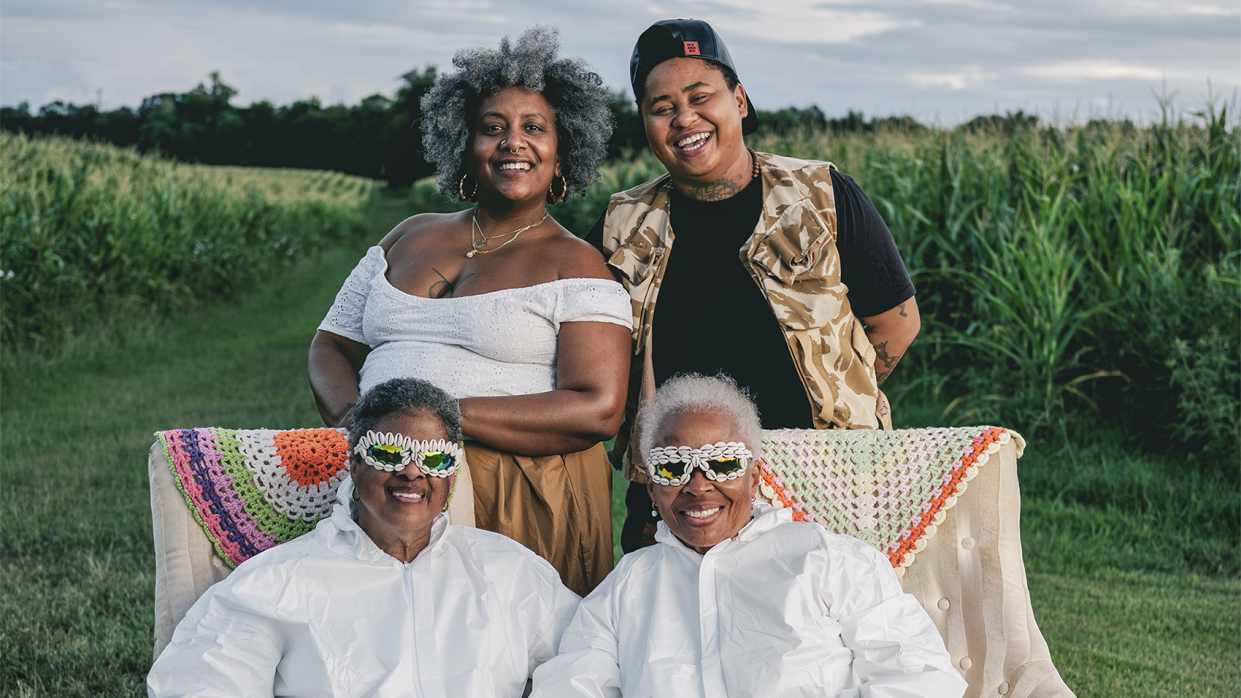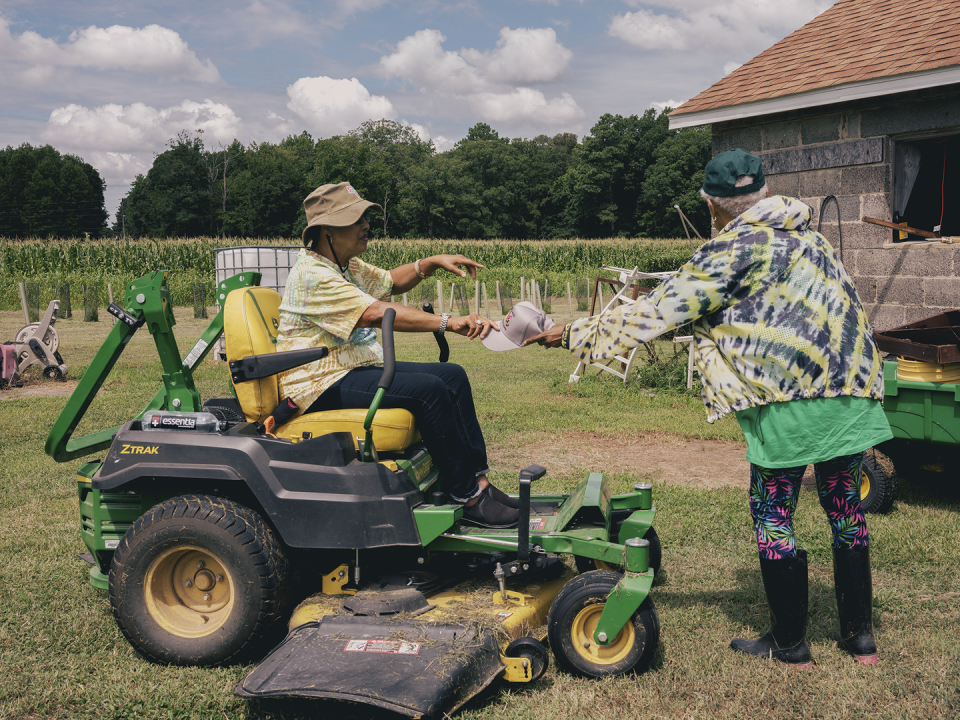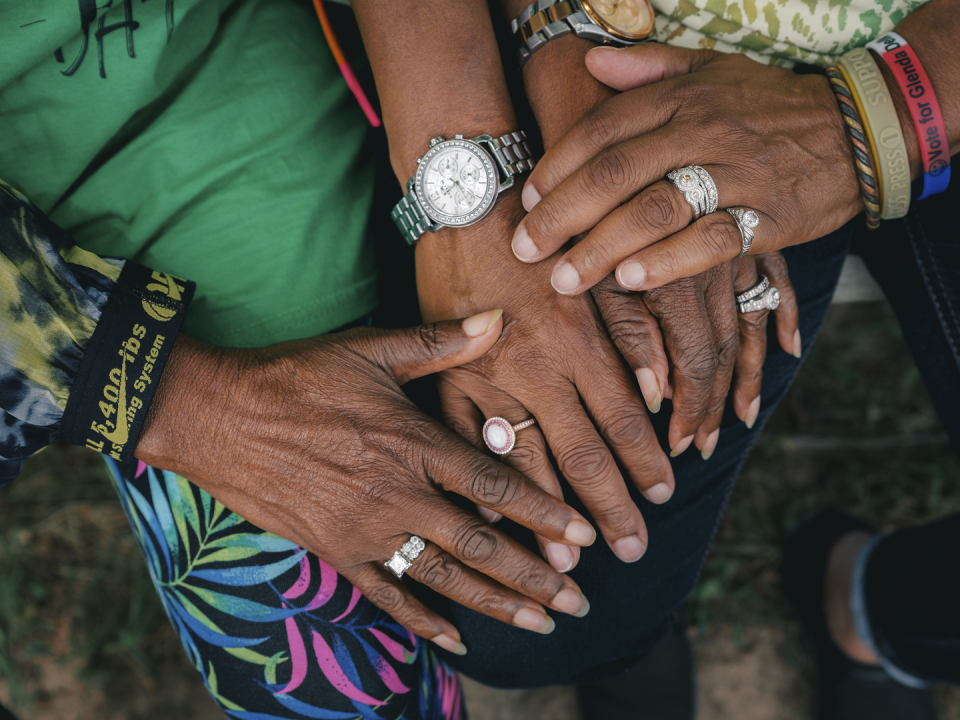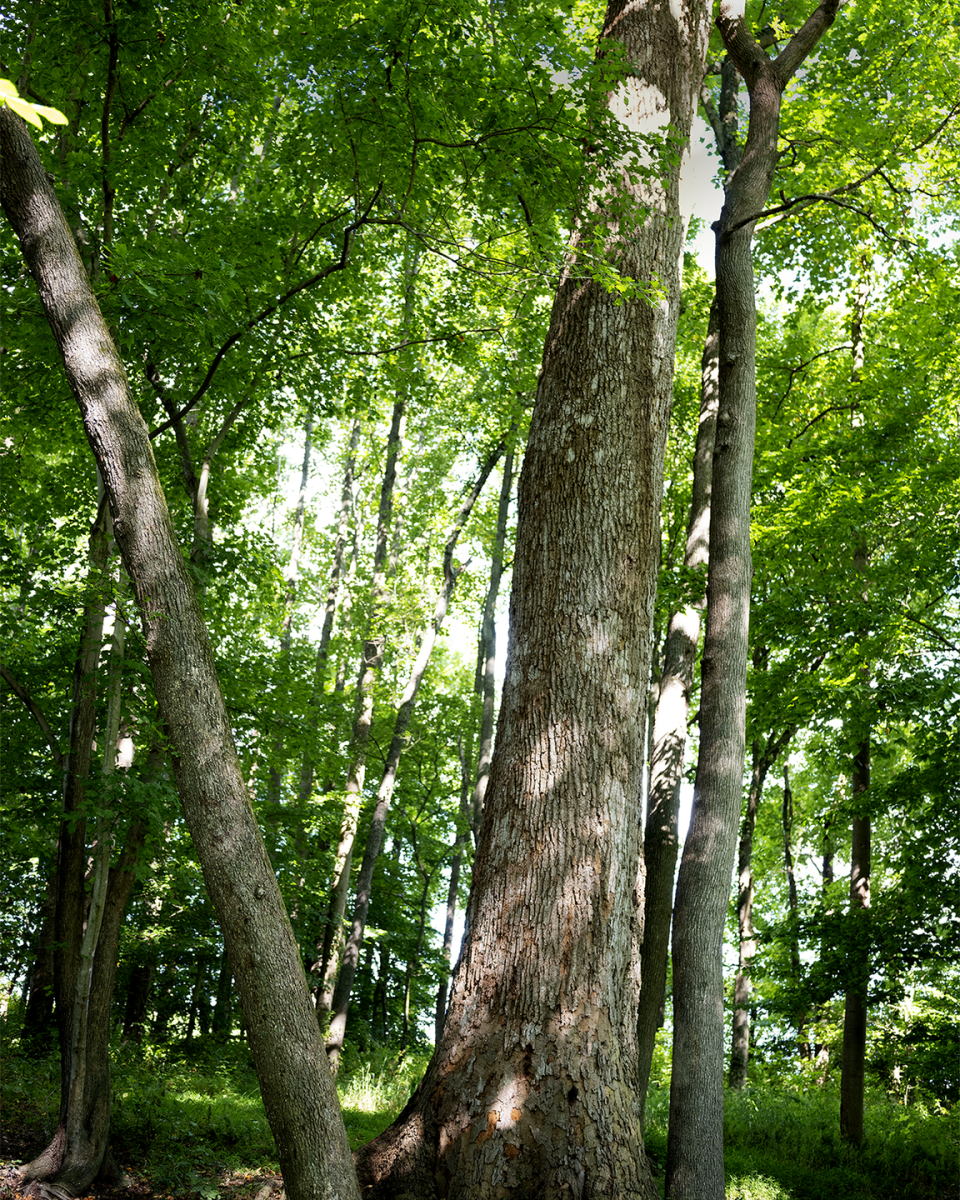These Black Gay Elders Are Saving a Part of Black History

When you visit Paulette Greene and Donna Dear, you have to bring something with you. For our offering, we’ve chosen cheesesteaks.
Paulette and Donna exploded into the internet’s consciousness this past summer after a short documentary about them, The Aunties, premiered at the BlackStar Film Festival in Philadelphia. The couple have been married for nearly a decade but together for 50 years. They’re also stewards of Mt. Pleasant Acres Farms, a 111-acre parcel of land in Preston, Maryland, that they’ve transformed into what they hope can be a new paradigm for community and climate justice. The farm was once part of a plantation where the abolitionist and activist Harriet Tubman’s family was enslaved and that later became a stop on the Underground Railroad. It is, notably, the site of the Witness Tree, a tulip poplar where Tubman gathered those escaping enslavement to pray before beginning the journey to freedom.
Through a mix of workshops, events, and educational programs, Paulette and Donna have established Mt. Pleasant Acres Farms as a model for sustainability and ecological conservation. But they also want the farm to function as a vehicle for restoring the relationship between Black communities and the land. Mt. Pleasant Acres Farms serves as an example of how a place that was the site of violence—the violence of white supremacy and colonialism—can be reclaimed and transformed into something liberatory without erasing that history.

Paulette, an educator, and Donna, an Army veteran, first met at a “do drop in” party Paulette hosted on New Year’s Day in 1974. “I cooked too good at that party,” she tells me, though I don’t quite believe her because she’s laughing. “You’re only supposed to have one drink [at a do drop in] and maybe a little bite to eat and get to stepping.” But the parties always lasted until 3 a.m., and this one was no different. Donna, Paulette says, was in New York working as a military recruiter, “but she recruited me. She was too hot to trot and said she had to leave.” Paulette made her a to-go plate, and Donna was back in a few hours. They’ve been together ever since.
Since the early 2000s, Paulette and Donna have worked to obtain federal landmark status for Mt. Pleasant Acres Farms. Along the way, the admirers, conspirators, and comrades they’ve attracted have taken to referring to them as “the Aunties.” Their story is one of romance but also one of possibility. They’re exploring new ways of rising up against and raising awareness around the climate crisis and also offering a connection to the histories of resistance to many of the isms that still plague us in the 21st century.
Like most people who hear about Paulette and Donna’s work, I was both charmed and intrigued by their mission and the life they’ve built together, so I reached out to the codirectors of The Aunties, Charlyn Magdaline Griffith-Oro and Jeannine Kayembe-Oro, about arranging a meeting. Charlyn and Jeannine, a married pair of artists, invited me to travel down to Maryland with them to visit the Aunties on a trip that began with a predawn train to Philadelphia, where the filmmakers themselves met, fell in love, and are now raising their three children.
Both Charlyn and Jeannine are longtime community organizers with backgrounds in urban farming. Charlyn, the child of a Trinidadian mother and a Guyanese father, was born in London, then eventually settled in Virginia. Jeannine, the daughter of a Filipina mother and a Congolese father, was raised in an Asian community and has worked deeply in racial justice and environmental spaces.
Charlyn and Jeannine first met the Aunties through an event focused on land stewardship and Afroecology that Charlyn attended. The conference was held in Cambridge, Maryland, which had historically been a site of resistance. “We talked with each other about what collectivity looked like for Black folks,” Charlyn explains. “It’s almost a decade later, and we are doing these projects with the Aunties in a way that I did not anticipate.”
The Aunties tend to encourage a reaction of reverence to their wisdom. But for Charlyn, it was something else: “I knew that my connection with them would be different than other people’s, as so much of our connection was through banter,” they say. “It was like, ‘Cool. We can pop shit while we learn together.’ I feel blessed to have built trust over time. We have built such a rich, loving, familial relationship.”
Of their first sight of Mt. Pleasant Acres Farms, Charlyn says: “I don’t think that I fully felt the power of the farm when I first arrived. This connection has been a cumulative braiding of moments. It is as if I knew I would have a protracted relationship to the land, and what I did not feel initially in terms of a quaking has been the pull and the tug of this place and their lives, interweaving with mine over the years. Honestly, I thought my relationship with the land felt like its own thing.”
Jeannine’s relationship with the Aunties and the farm is more entwined. “If anything does have a separate feeling or relationship, it would be the [Witness] Tree,” she says. “But they just charmed me so much, the Aunties. I think I was in awe. One of my first times on the farm, I was helping do sweet potatoes, and I just wanted to eat it right there, out of the sand, out of the dirt. I was just like, I want this place in me. I still don’t think sometimes I can believe it and that my journey led me to this place. And I think that because I’ve always been in search of sacred space, sacred land.”

Paulette and Donna came to the farm through Paulette’s family, which owned land nearby. In Caroline County, Maryland, she tells me, it was easier for Black people to buy land; at one time, it had the highest rate of Black landownership on Maryland’s Eastern Shore.
While Paulette spent her childhood in New York City and Maryland, Donna grew up in Pataskala, Ohio, just east of Columbus, on a 300-acre farm. Donna says that as a child she wasn’t taught much about the realities of enslavement or the people like Tubman who resisted it. Her parents’ generation “stressed education, but not so much the history of slavery. It probably was painful. They concentrated on us becoming educated. They thought that if you became educated, then you could be a whole person as you engaged with larger society. We were not encouraged to emulate; we were told to study so that we could create our futures on our own terms,” she concludes wryly.
Paulette is more direct. “The first thing we need to do is recognize that Harriet Tubman is not just a symbol for freedom,” she says. “Harriet Tubman’s mission was to bring people out of enslavement. Unfortunately, when you move geographically, it doesn’t necessarily mean that you’re out of slavery, because it’s entrenched in the society in which you live. It also lives in your psyche. Who lets someone call their children minorities? How do you buy into that? The conditions that Harriet contended with then are different but very related to the work we need to do now to dismantle the slavery of mind, body, and spirit.”
When we finally reach the farm, Jeannine points to the top of a tree poking up out of the forest. “That’s the Witness Tree,” she says. Later, she will tell me that researchers have estimated the tree to be at least 400 years old. That means, Jeannine explains, that for generations, before white colonists arrived, the people on this land made conscious decisions not to fell this particular tree. And that knowledge would have been passed on to Tubman’s father, Ben Ross, a woodsman who tended this forest for his family’s enslaver and avoided cutting down that poplar, even though other trees around it were used to build ships. Even in the midst of great generational violence on this land, there was a sense of tenderness and cultivation.

The farm consists of a house set in a wide, neatly mowed lawn, with fields at the back. We weren’t successful in procuring cheesesteaks at the station in Philadelphia, but Jeannine has brought a pastrami sandwich, which Paulette accepts with pleasure. We angle a picnic table into a pool of shade. The Aunties’ dog, a black terrier named Minty, in honor of Tubman, who was known as Araminta Ross, skips and plays on the lawn.
Paulette ended up joining Donna when she was stationed in Japan in the 1980s, decades before the Supreme Court recognized same-sex marriage and long before ”don’t ask, don’t tell” was repealed in the armed forces. The Aunties, though, don’t like the word queer. Lesbian is even a stretch. “I should ask them about sapphic,” jokes Charlyn, who refers to it as “the life.” “They are part of a generation of people who are proudly in the life. Something the Aunties always say is that they never felt like they had to explain themselves to anyone. They just were,” Charlyn explains. It’s the “unapologetic nature of who they’ve been.”
Paulette and Donna are practiced hosts. They engage in the art, lost to most of us born post 1980, of entertaining. So the stories that come are incredibly seductive ones, well honed for laughs and the lines that resonate. The Aunties are aware of the deeper value of the land they hold and are eager for it to be officially recognized by the National Park Service’s Network to Freedom, the federal program that lists and promotes sites connected to the Underground Railroad. Paulette speaks the most often and with the most spirit, while Donna is more deliberate in her pronouncements—fitting for someone who spent her life in the military.
Paulette talks often about the importance of being “W-H-O-L-E,” which she spells out this way. I’ve always approached the question of being whole as elusive as the edge of the sky—a theoretical space that one finds meaning in the pursuit of but never reaches. The Aunties, though, are confident in the reality of achieving wholeness. They treat it as a given.
The Aunties are skilled at making kin. It’s another lost art, one that feminist writers like Donna Haraway argue will be integral to our survival as the world violently changes during the climate crises. Haraway uses kin to mean not merely blood relatives but any being—human, animal, or plant—that lives close to us, and it is our kinship that will determine our ability to survive.
Near the Witness Tree, the Aunties have planted a turnip field, and we spend some time pulling up turnips before we go see what we’ve come for. Paulette will give me a bag full of the greens, and for a week after, I’ll eat them over toast, sometimes late at night while I’m writing—the last piece of that earth. But for now, I am looking for what all four women have been working to protect: the large tulip poplar where Tubman met those who knew they were free and were ready to meet death to prove it.
The tree is in a small, slanted clearing. There are two thinner trees that frame it, almost forming a threshold to reach the tree itself. Knowing its history, its place as a site of anticipation and anguish, I did not expect the space to feel so peaceful. Jeannine tells me that she and Charlyn have spent hours here, sometimes sleeping by the tree overnight, trying to understand how they might tell its story.
When I tell them I’m surprised by the tranquility, Charlyn says, “Not every site of enslavement is meant to be hardened and wrong. Some are way stations.”
Back at the house, Paulette asks me to shuck corn. I return the ears hairy with silk. She scoffs, makes me do it again. I think we have made some kind of kin, though, because she fries fresh perch and makes us sandwiches.
As we drive away, we pass over a tributary of the Choptank River that winds through this land. The water here is brackish, Jeannine says, halfway between salt and fresh, a liminal state that is incredibly fruitful for fragile treasures like oysters. As we drive over the water, Charlyn kisses their fingers and waves them out the window—a thank-you to the land.
You Might Also Like


